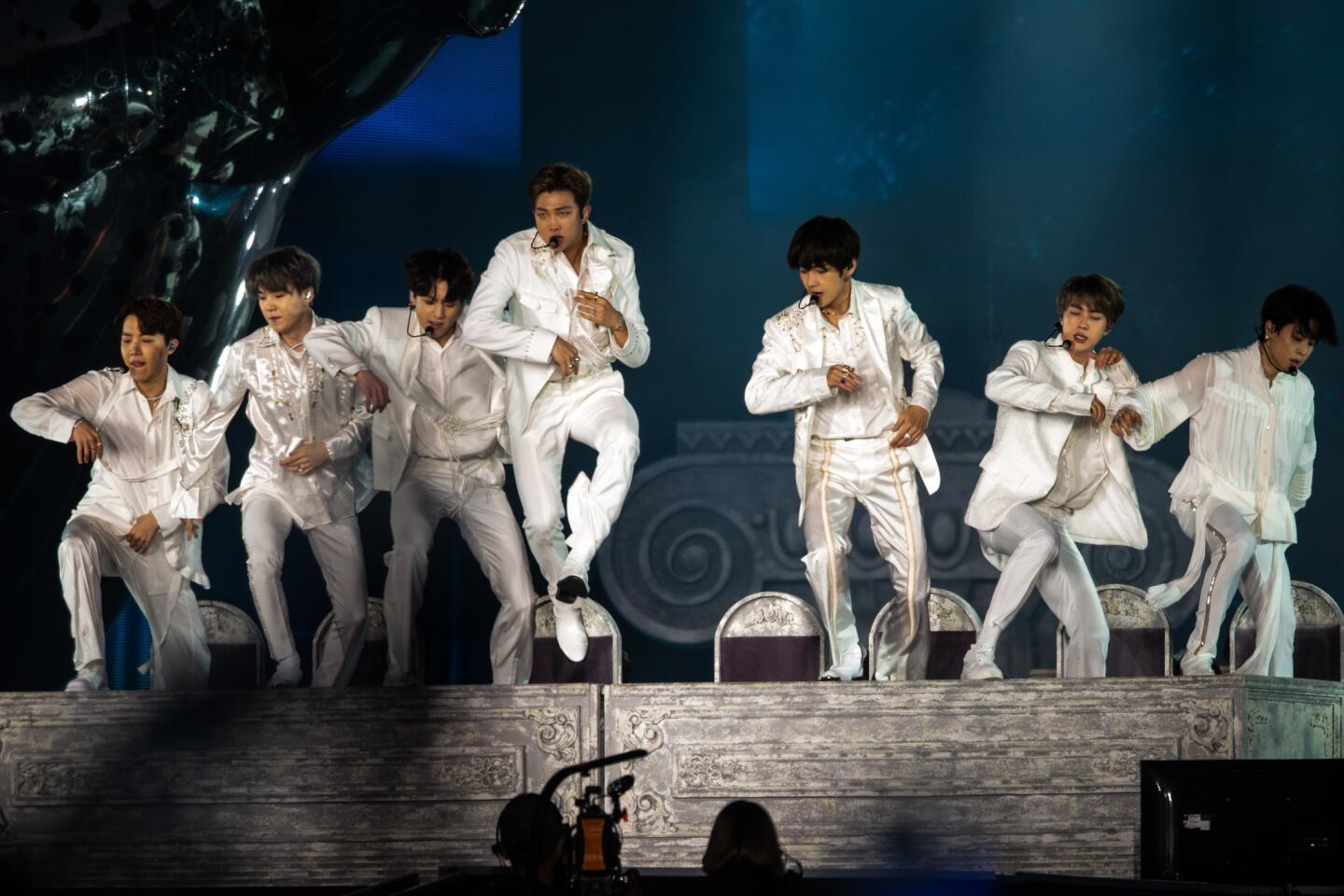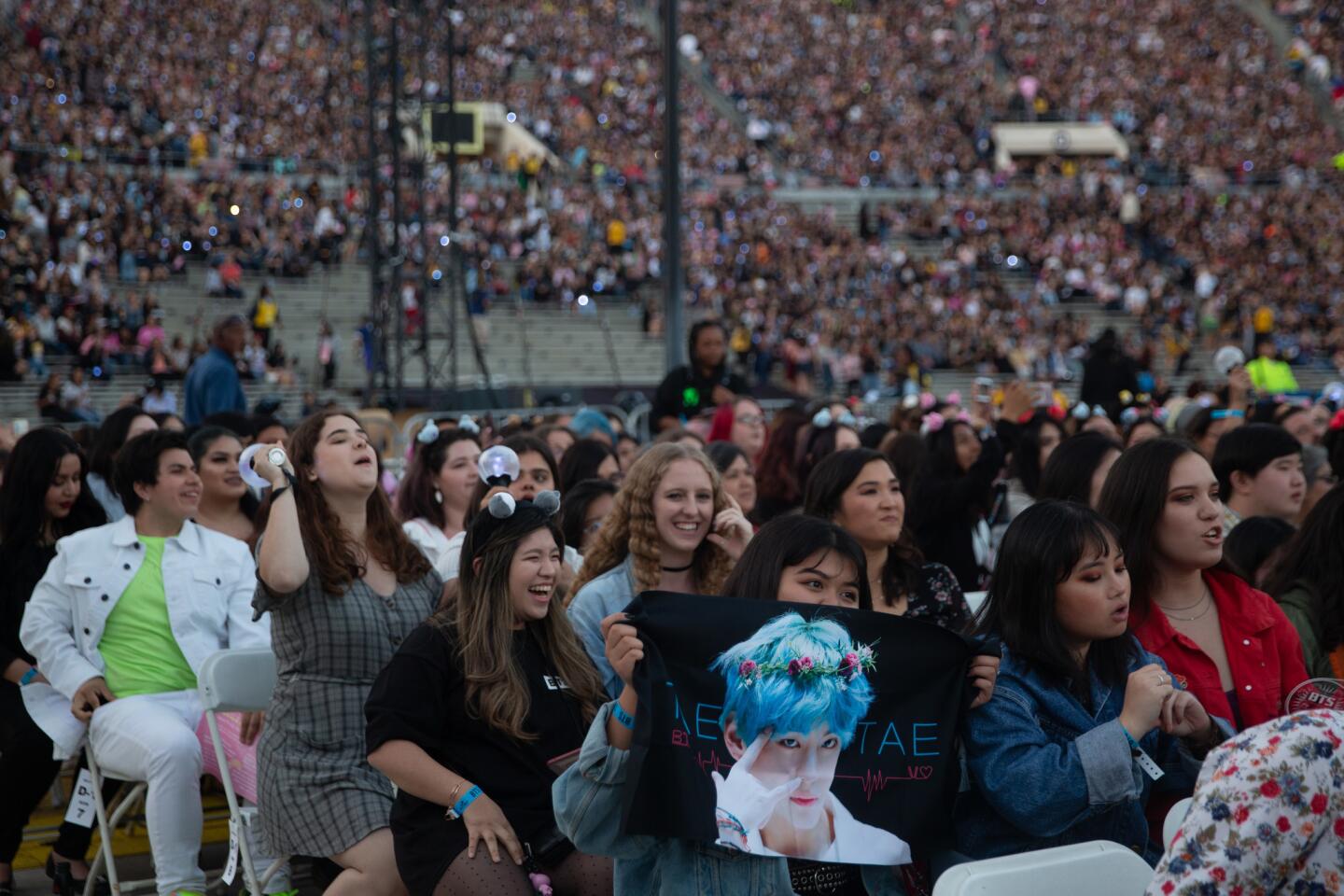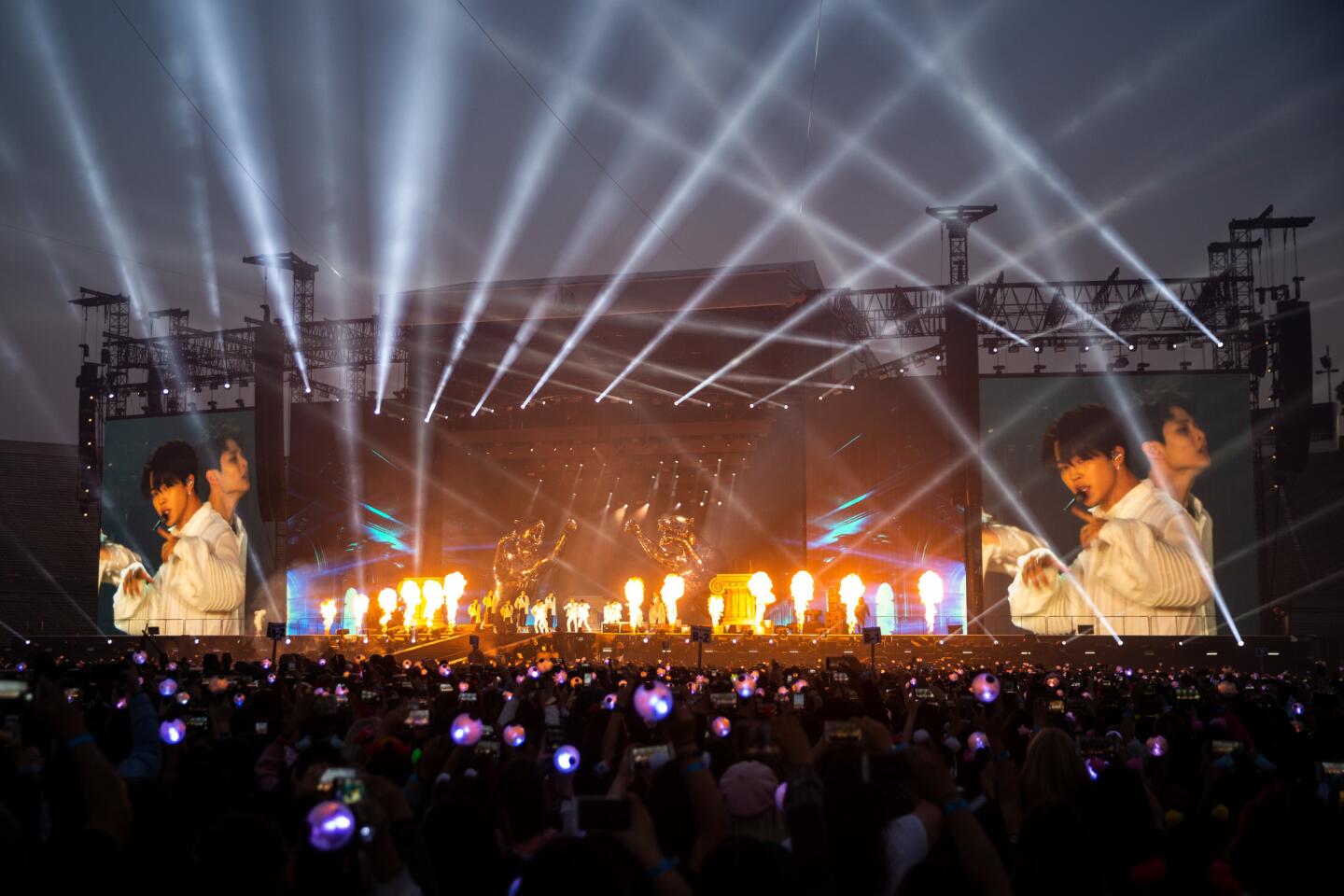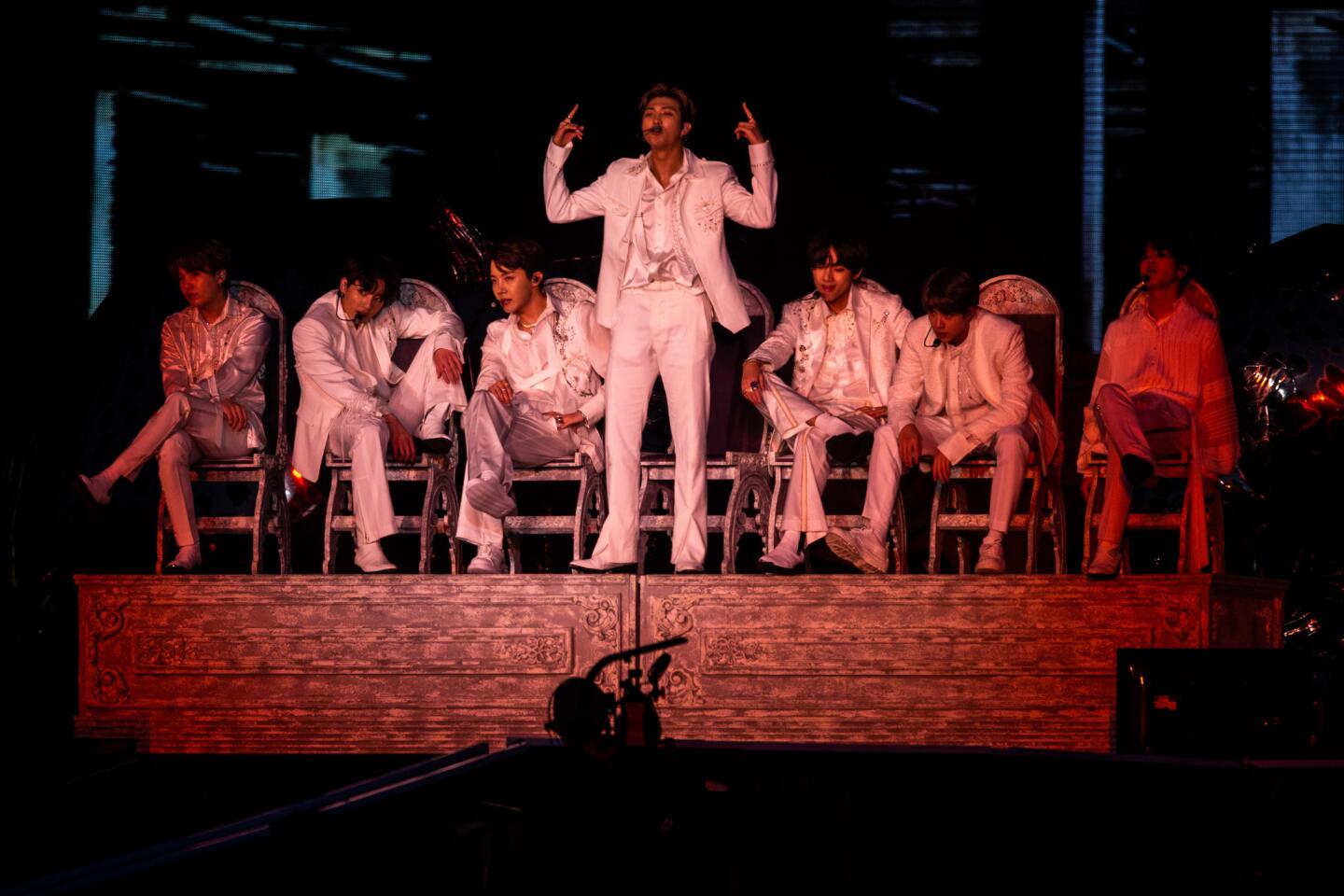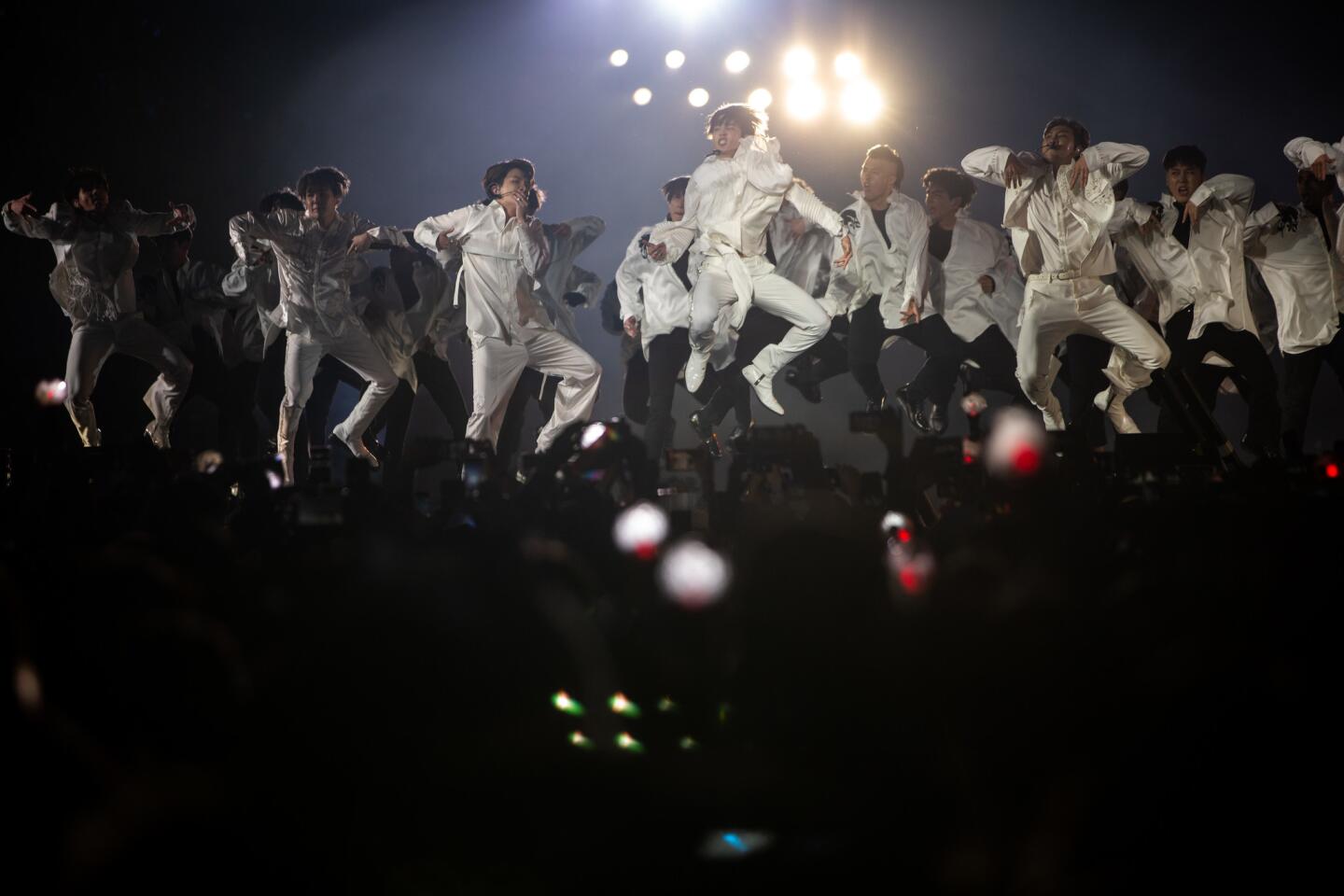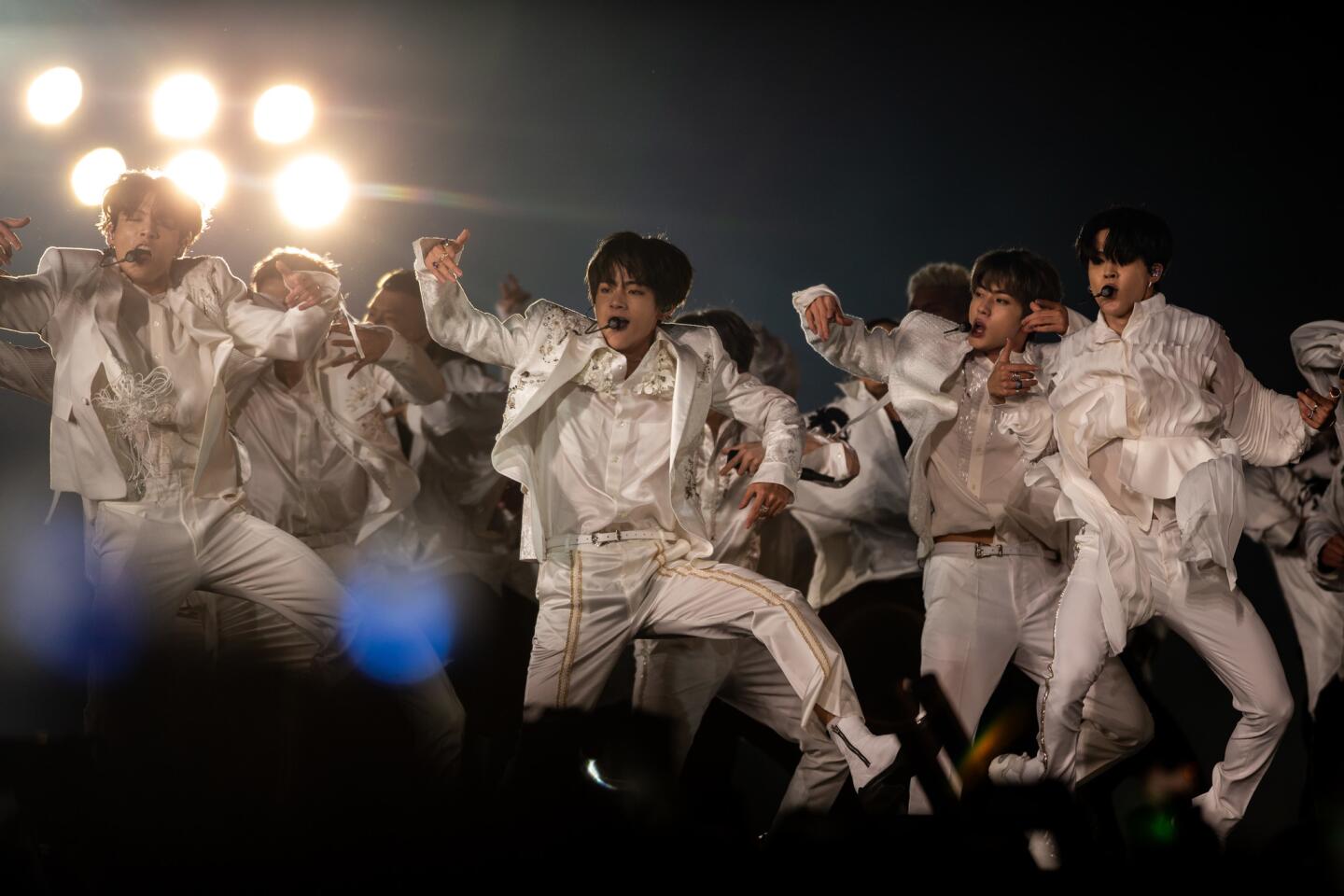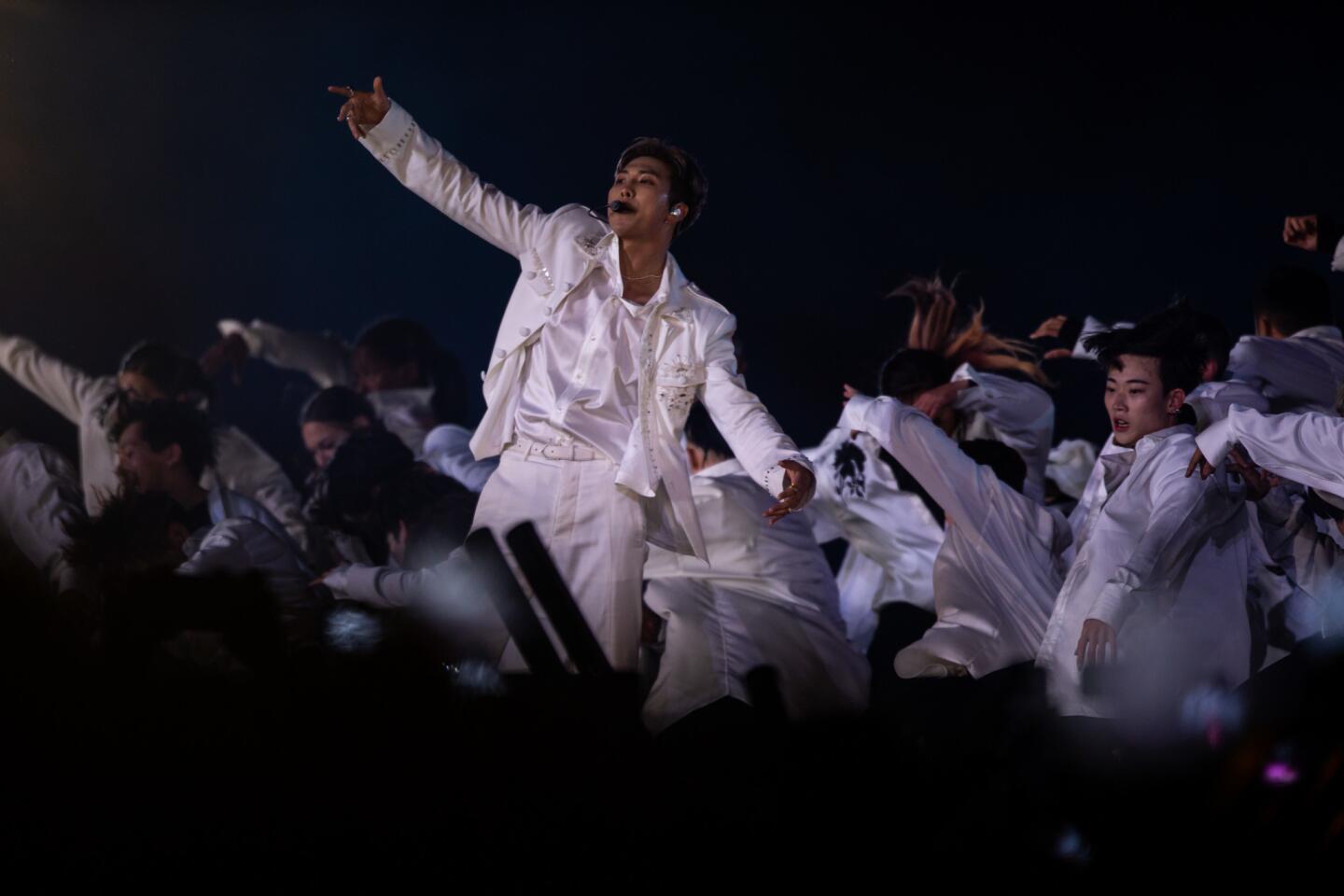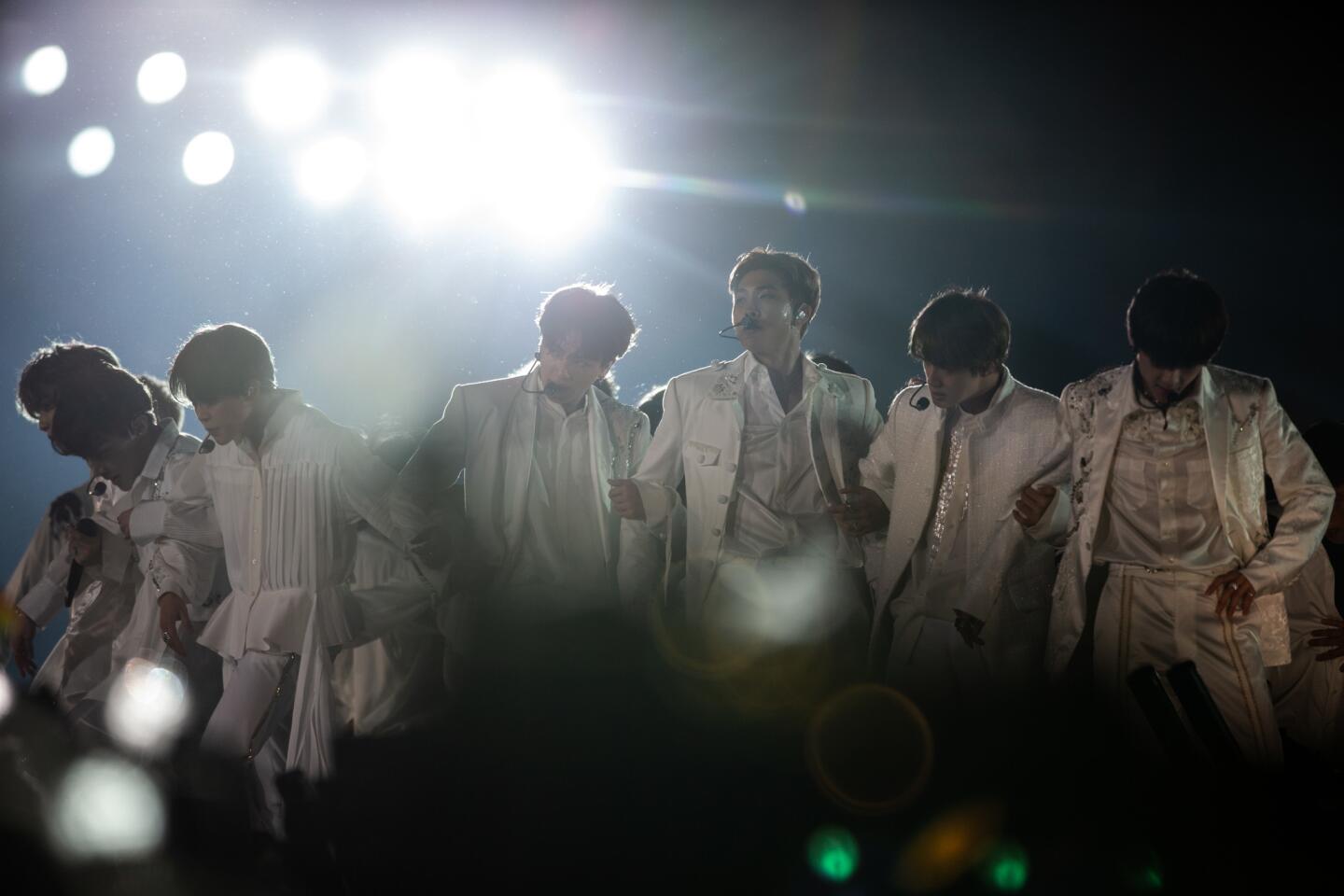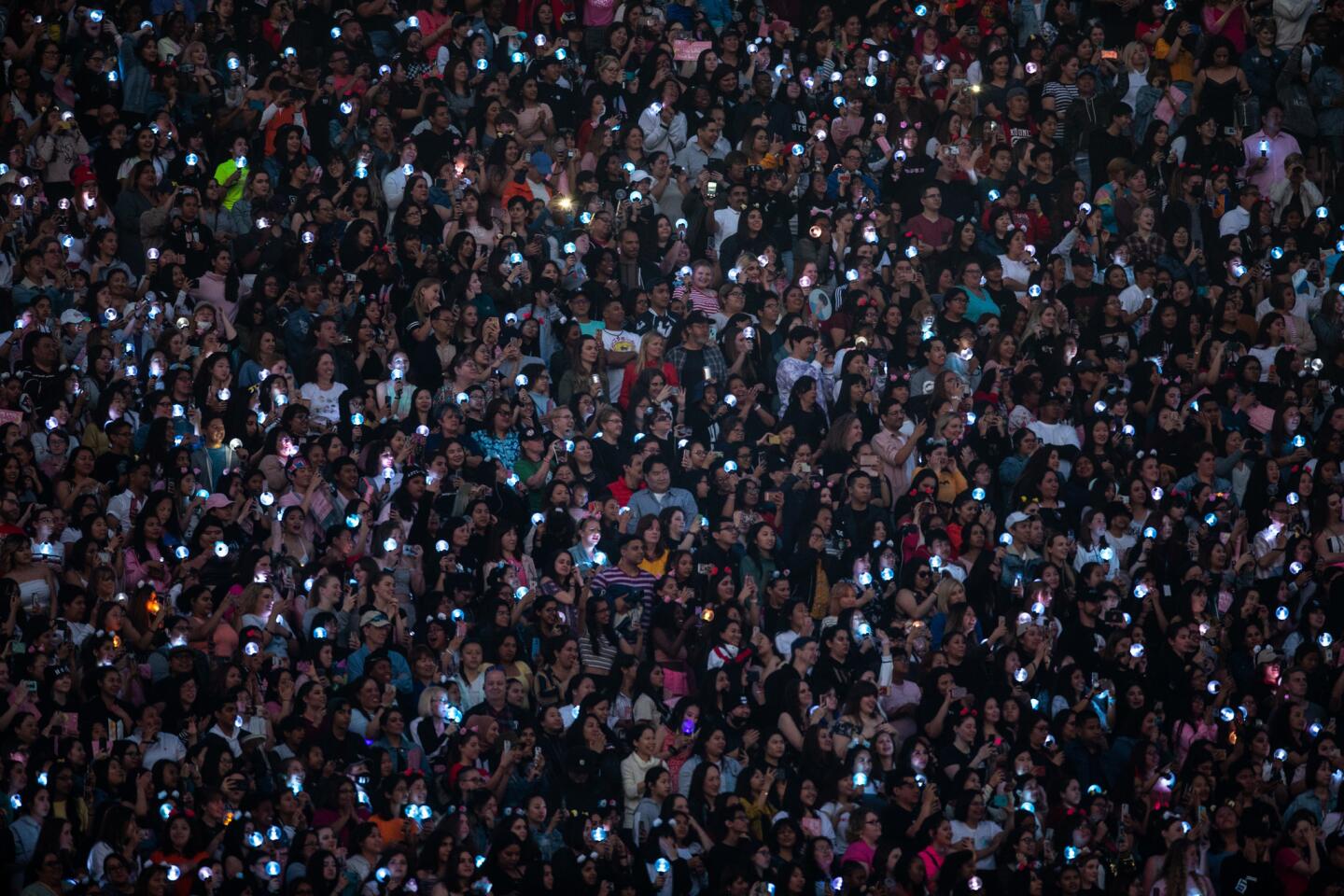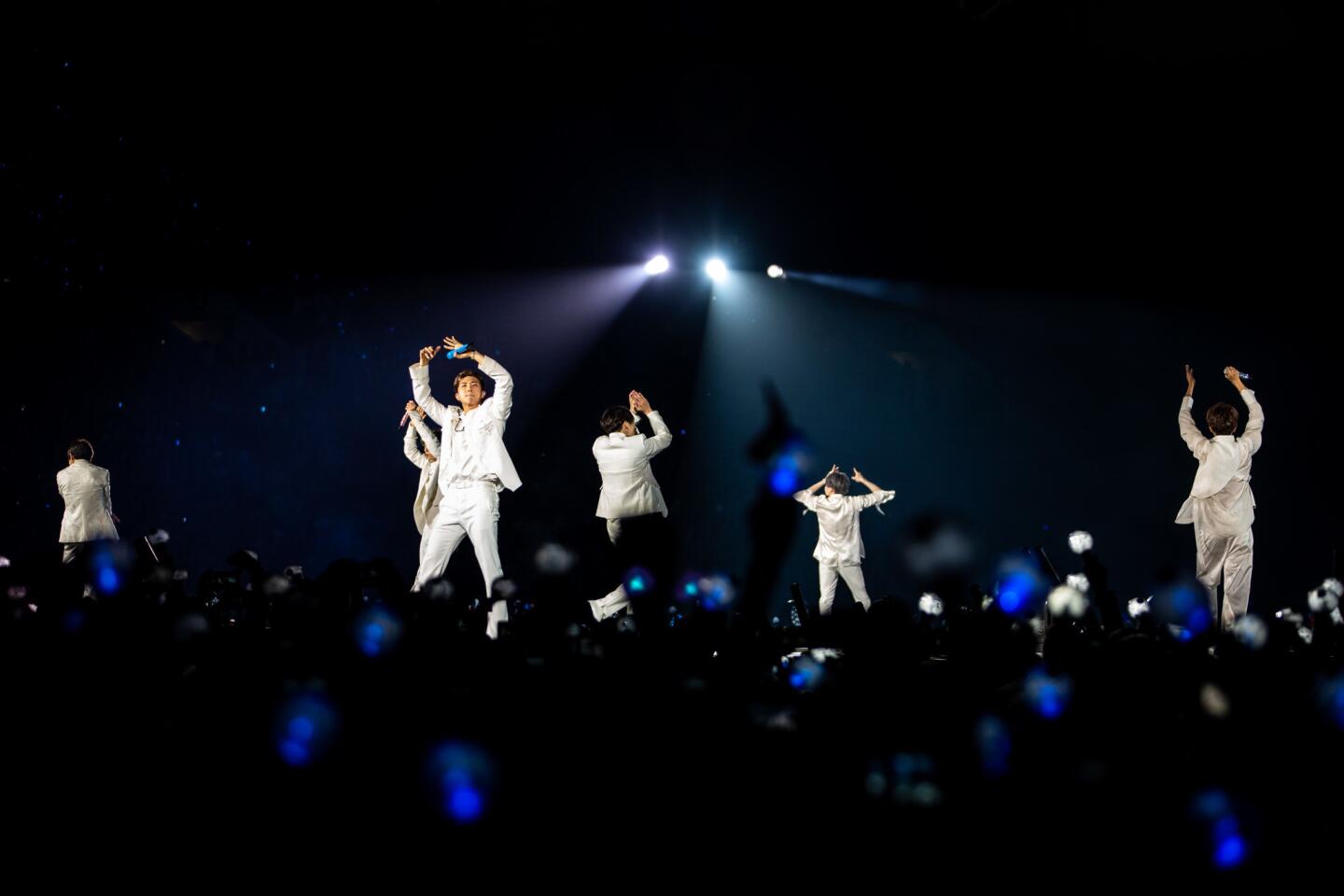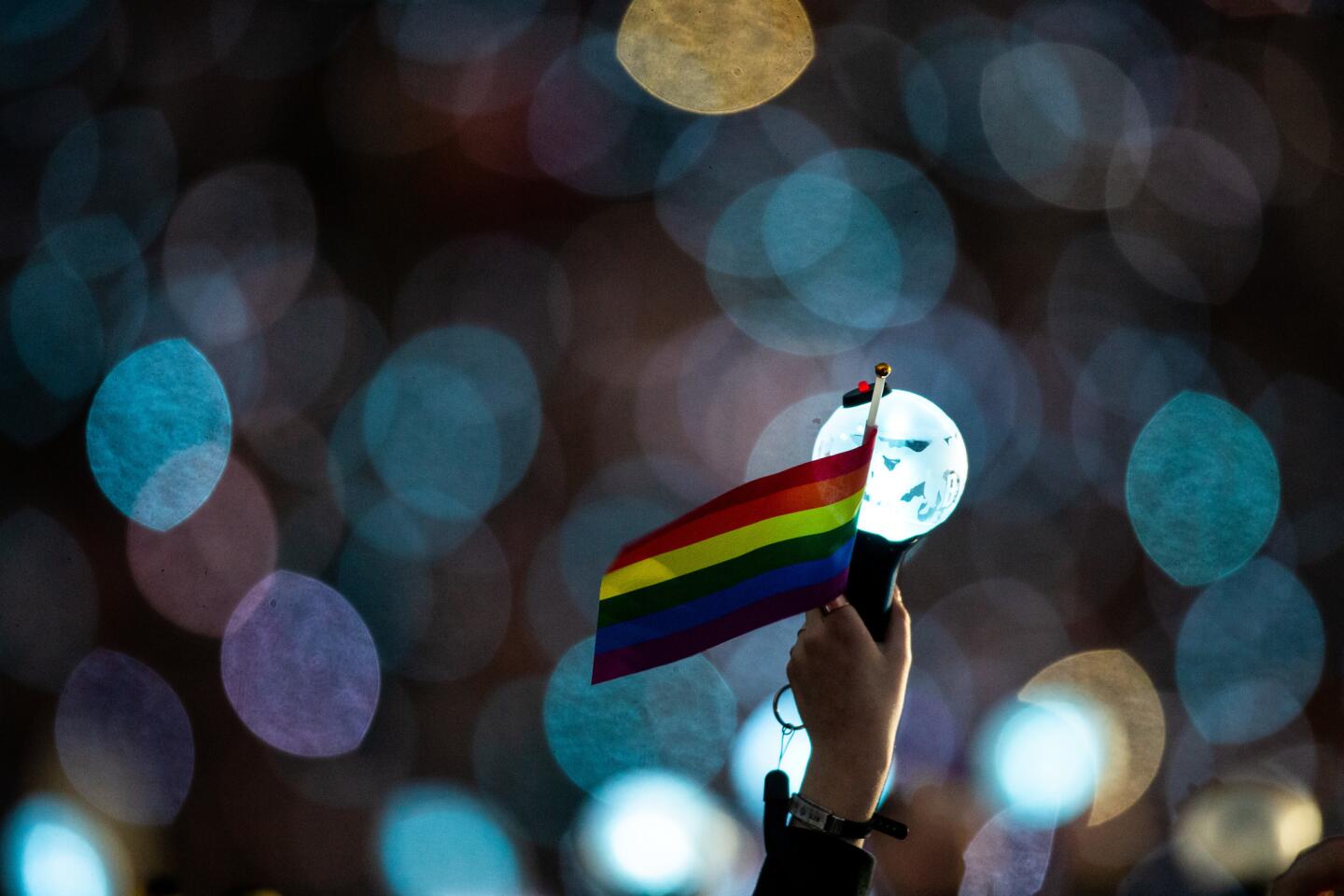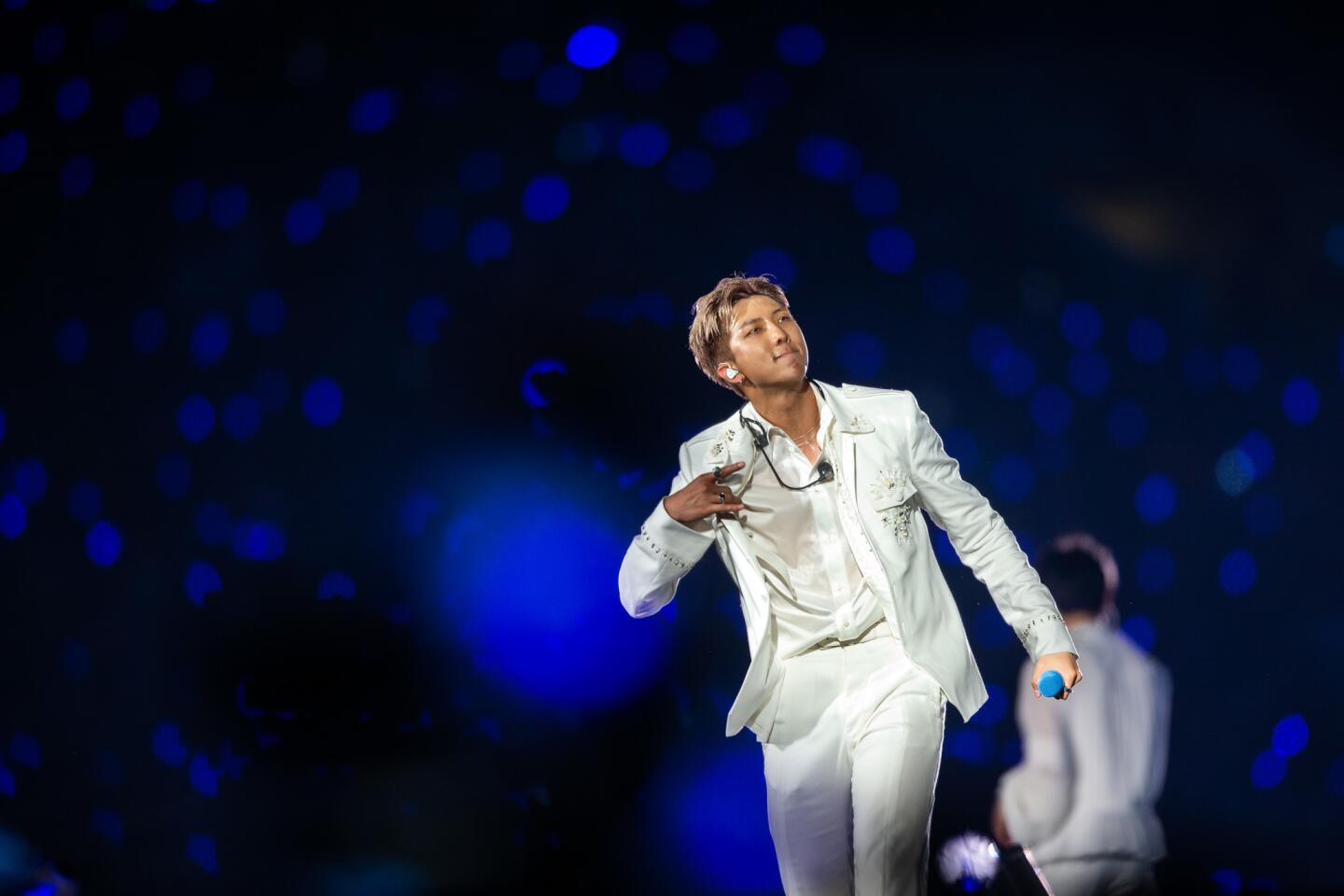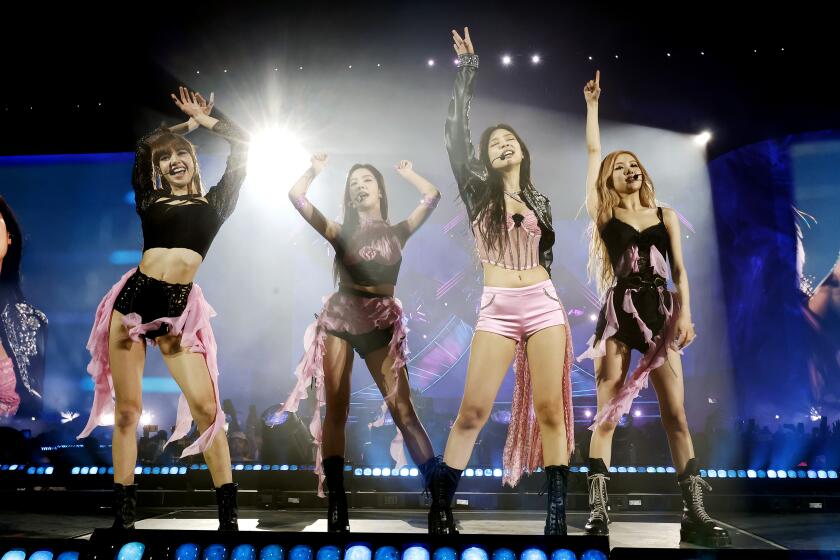BTS, the new kings of pop, conquer a deafening, sold-out Rose Bowl
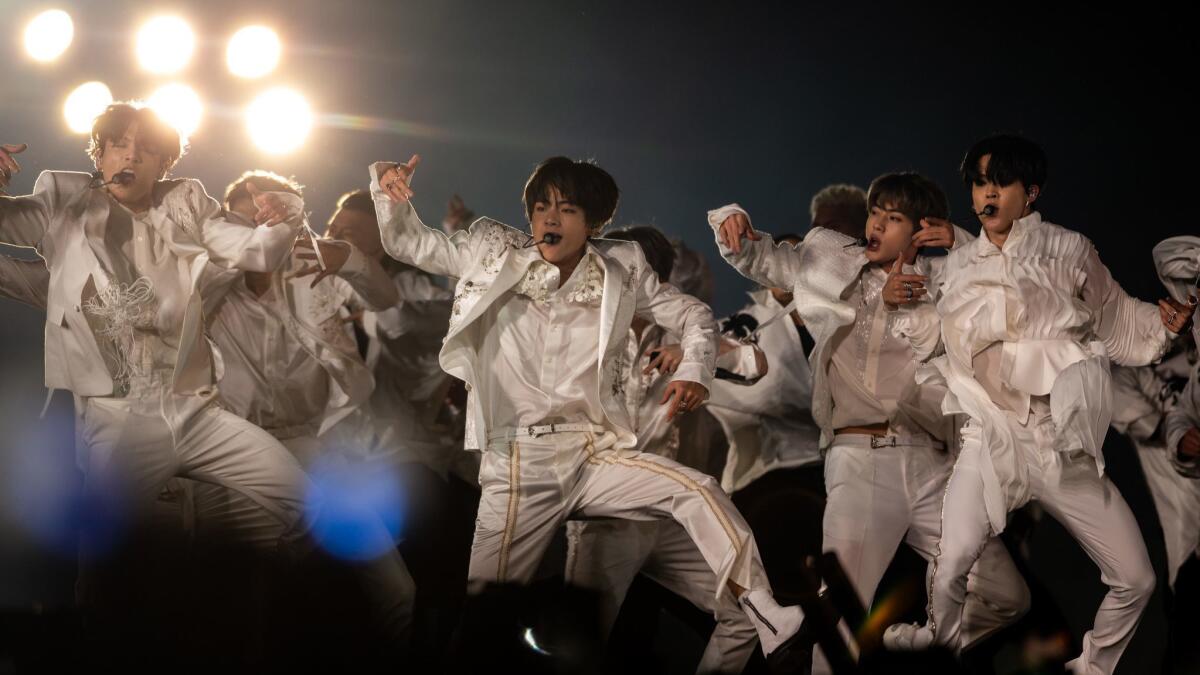
- Share via
The first thing you saw were the lines.
As queues for pop-star stadium shows go, they were orderly and patient. But from the moment the trees parted on the way into Pasadena’s Rose Bowl on Saturday night, and the building-sized banners for K-pop conquerors BTS emerged, the crowds waiting outside were staggering.
An estimated 52,000 fans — from preteens to bemused dads, many Asian American but also Latino, black and white — wound along the Rose Bowl grass. Some had camped out for days to save their spots.
In a few hours, BTS would play the first of its two largest shows in America to date, a crowning achievement for a band that sings primarily in its native language. For the genre, it’s a commercial peak that’s been a decade in the making. God forbid you let the occasion pass without a souvenir.
A $60 Bluetooth-synced lightstick that linked to your specific Rose Bowl seat and flickered in time with the music onstage? Of course. What kind of BTS Army soldier are you? A high-fashion hoodie with the edifying message of this “Love Yourself: Speak Yourself” tour? How could you prove you were there otherwise?
“It’s become huge, there’s now so many K-pop artists coming to the U.S. in the next few months,” said Amy Davis, 31, who flew in from Detroit for the show. While she waited in one of those lines, she cited acts like Blackpink, the talk of last month’s Coachella Valley Music and Arts Festival, as signs that K-pop — a futuristic, upbeat blend of dance music, spitfire hip-hop and balladry — is thriving here.
BTS hit new milestones for K-pop: a trio of U.S. No. 1 albums within a year and a sold-out, four-night run at Staples Center last year. Moreover, in a time when the U.S. government is openly hostile to immigrants, America’s pop charts have become more global, increasingly defined by South Korean and Latin artists. Pop stars are now frequently imported into the U.S., a sea change from the days when homegrown acts from Michael Jackson to Britney Spears taught teens around the world how to sing, dance and consume Pepsi like Americans.
Looking out on this ocean of fans in matching BTS garb, this felt auspicious. Beyoncé, One Direction, U2 and Depeche Mode have all headlined notable sold-out Rose Bowl stands. But they weren’t bringing an entire genre and country with them.
“K-pop has taken over,” Davis added. “ It’s like, what’s even ‘western’ pop anymore?”
Over the last decade, K-pop grew from an established regional genre in Asia to an underground, internet-driven phenomenon in America. Los Angeles was arguably the heart of it, hosting the ultra-popular KCON fan convention downtown, where more than 100,000 fans could finally see live acts they’d watched only on YouTube.
Other K-pop acts like Girls’ Generation, G-Dragon and 2NE1 had flirted with crossover U.S. stardom before. Others like Twice and NCT 127 are waiting in the wings. But at the Rose Bowl, it was obvious BTS had hit an escape velocity of fandom.
To judge from the mood outside on Saturday, its rise feels like the peak trembling days of Beatlemania. But the Fab Four didn’t have the most powerful fan legion in all social media (cross them at your Twitter mentions’ peril) and a whole guide about how to behave if you see BTS at the airport (“Please keep BTS at your double arm’s length so that BTS can walk safely”).
One 2018 study, from the South Korean consulting firm Hyundai Research Institute, estimated that BTS alone was worth $3.6 billion to the South Korean economy and that 1 in every 13 tourists to South Korea in 2017 cited BTS as a reason for their trip.
After a performance on “Saturday Night Live” and this sold-out U.S. stadium tour, those numbers must be rising, even in places you might not expect.
“Where I’m from, people shake their heads at you for liking K-pop. They don’t understand it so they don’t want to listen,” said Ciara Cockrill, 19, who flew from Paducah, Ky., for this show. “But I’m not ashamed at all, and there’s actually more K-pop fans in the South than you’d think.”
In the minutes before the show, as the sun went down over the lip of the Rose Bowl, blood pressure spiked in the crowd. One young fan screamed in delight as a BTS music video clip played on the stage’s LED wall.
“I apologize in advance for everything I’m about to do,” she shouted at her section mates. They laughed and assured her she was among friends. When a pair of silver jaguars inflated on the sides of the stage, she gasped again: “I’m going to throw up I’m so excited!”
Suddenly, the lights went dark. There they were: Jungkook, Jimin, V, RM, J-Hope, Suga and Jin.
The sound in the crowd was overwhelming. It felt like the first moments of an earthquake, when you’re reminded that nature (or a sea of 52,000 BTS fans) is capable of astonishing, uncontrollable force.
The band was ready for it. From the sci-fi hip-hop bounce of “Dionysus” and “Not Today” to the sweet tropical balladry of “Euphoria” and the self-aware, stardom-critiquing EDM of “Idol,” its music arced between almost every modern genre.
Its latest sugar-sticky hit, “Boy With Luv,” recorded with the U.S. pop singer Halsey, could be the band’s version of “Despacito,” bringing in a whole new audience on its own terms. But then so could a whole lot of its songs. Everyone in the crowd knew every Korean word to all of them. Their lyrics have an uncommon candor for K-pop, sometimes touching on depression and the toll that K-pop stardom takes on young people. Even if the people in the crowd didn’t understand it all, they felt it.
Over the course of the three-hour show, BTS’ members were lifted on trapezes over the crowd. They climbed Greek towers and slid down inflatable slides. Singers oscillated for solo numbers, then rejoined their band to mug for selfies in front of an undulating sea of those $60 lightsticks. Costume changes came every few songs, from billowing tunics to covetable streetwear. They could dance together with the utmost precision, or just kick back and marvel at the scene before them.
Underneath all the spectacle, there was some fine-honed musicianship, too. In these solo sets, their individual personalities came out even stronger. Jungkook is often the charming frontman and flashed a bit of his abs onstage. V’s sexy, spooky R&B single “Singularity” simmered like a D’Angelo ballad. Jin’s sparkling piano on “Epiphany” had an austere composure.
At the K-pop-obligatory moments when the music stopped and they talked to the crowd, one by one, it was clear how different this dynamic of fandom is. The audience awwwed at their every glance, every smile, at the particulars of how they playfully jostled with each other between songs. The native Korean speakers got the message first, before an English interpreter let the rest of them in.
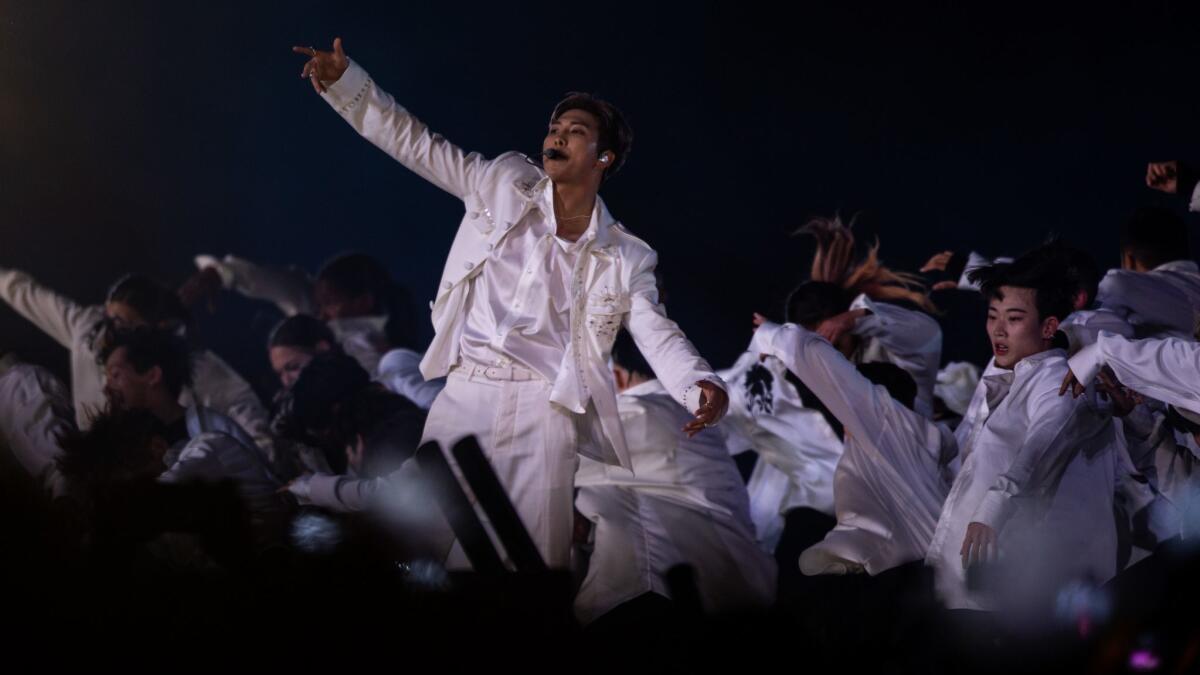
For some in the crowd, this stadium tour was a peak of fandom, and they know a valley will have to come someday. BTS has toured and recorded relentlessly over the last few years, and its members, now in their early 20s, will eventually have to serve their mandatory stints in the South Korean military. Their own fan army — and their South Korean label Big Hit Entertainment — will just have to wait out their absence when it comes.
“They work so hard, it’s nonstop, so I wanted to see them before they needed to take a break,” said Caroline Brightwell, 22, who came to the Rose Bowl from Nashville.
Although K-pop fandom has recently reeled from the fallout of the Burning Sun scandal (a prostitution and secret-camera ring that took down several K-pop stars), BTS’ stadium tour showed the genre in its best light. All the ebullience was PG-rated: According to Pasadena police, there were only two arrests the entire night at the show. One person was nicked for operating a drone, another for selling bootleg merch outside the stadium, police said. The Rose Bowl beer vendors, usually slammed at a sold-out show like this, were all but abandoned.
As BTS played its radiant, uplifting “Mikrokosmos” and fireworks burst over the Rose Bowl after its final, red-eyed bows, a K-pop band took its place among the elite of American live music. This tour will soon hit Chicago’s Soldier Field, MetLife Stadium near New York City and London’s Wembley Stadium before heading back to Asia. Bands spend their whole lives working to get here, a stage where no one from BTS’ genre or country had come before.
Was it a peak, or was it just a beginning? For BTS fans, it was both at once.
“You’re just gonna see this scene get bigger and bigger,” Cockrill said, alight with enthusiasm for all her K-pop shows to come. “I still think someone can top even this.”
For breaking music news, follow @augustbrown on Twitter.
More to Read
The biggest entertainment stories
Get our big stories about Hollywood, film, television, music, arts, culture and more right in your inbox as soon as they publish.
You may occasionally receive promotional content from the Los Angeles Times.
